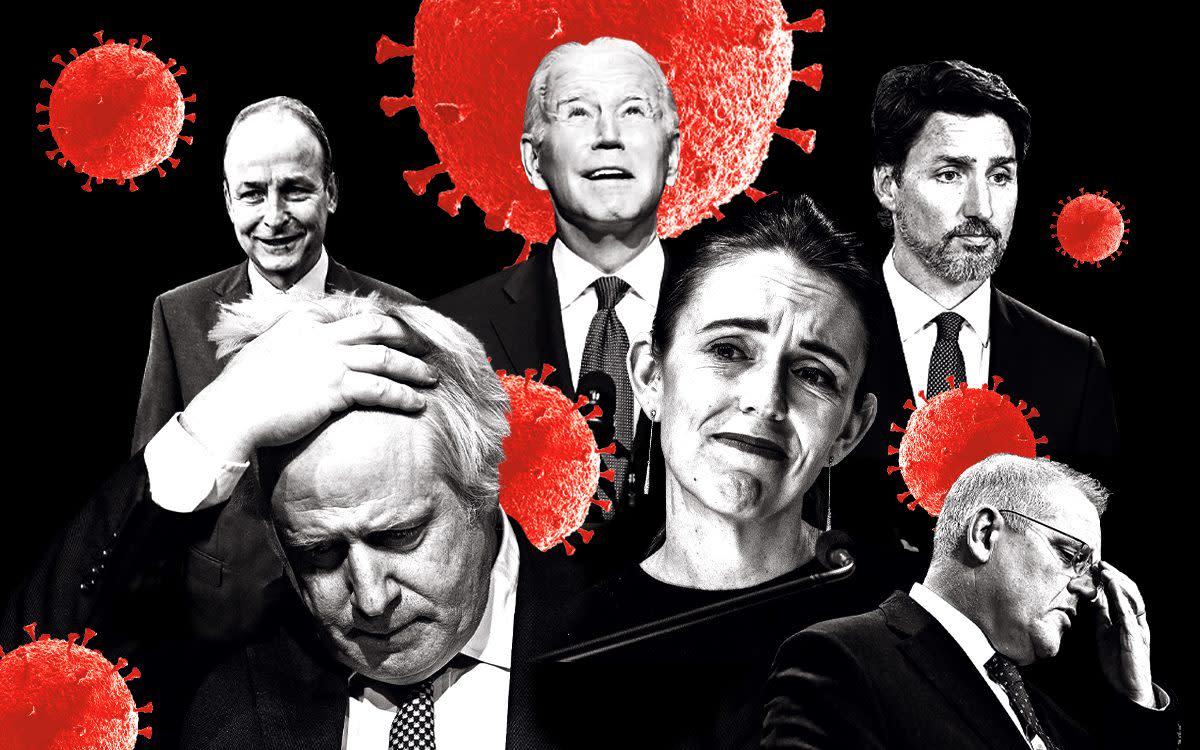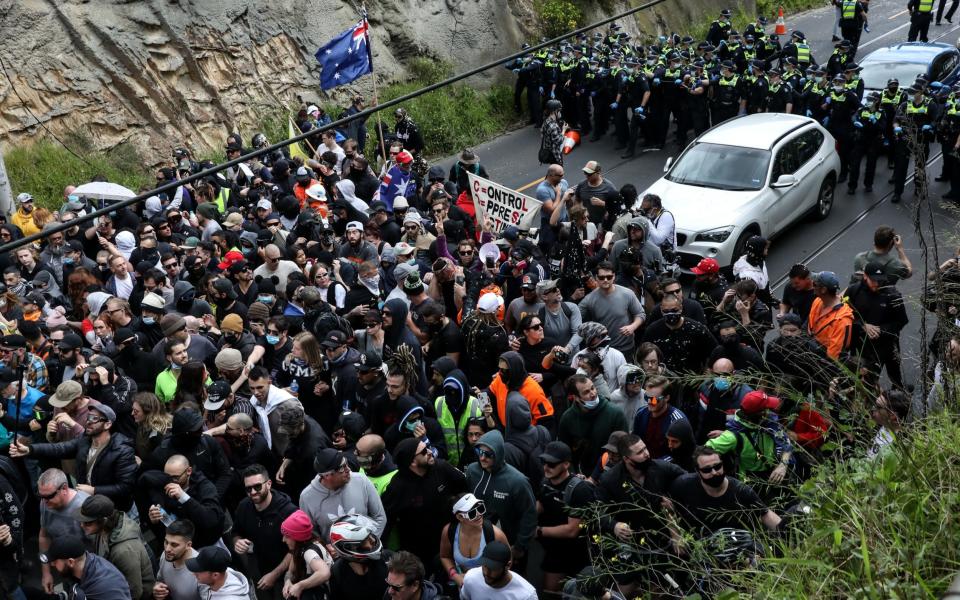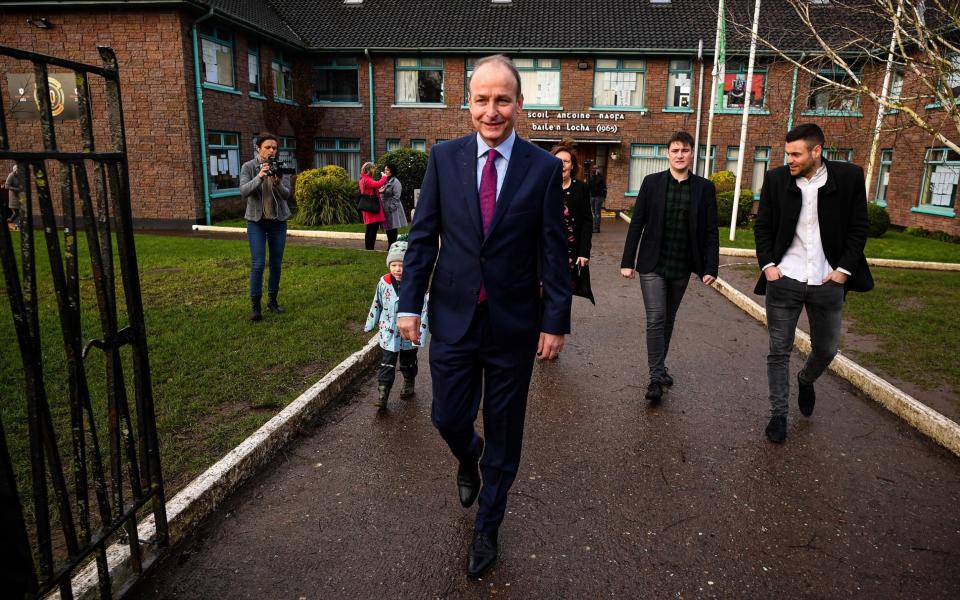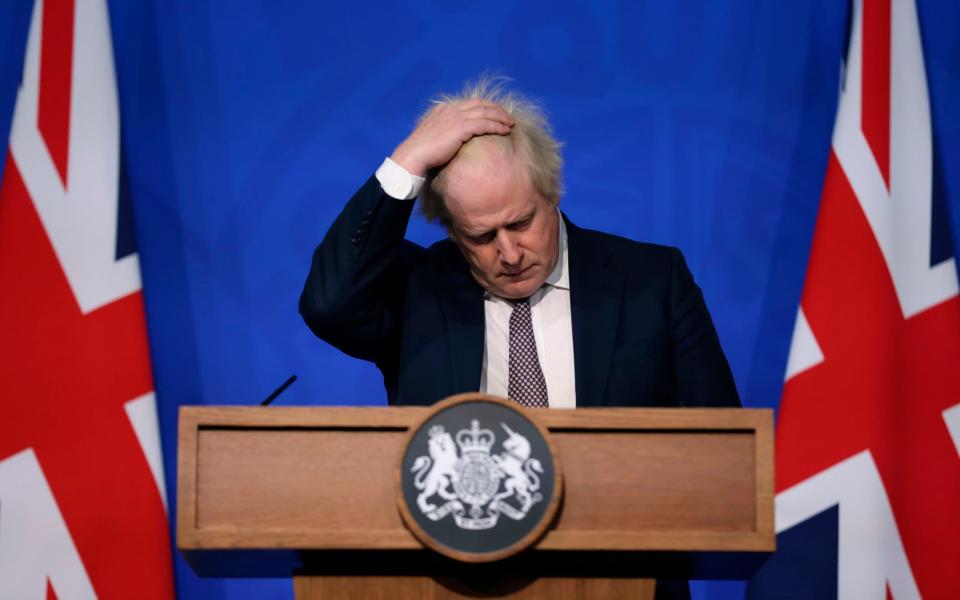The curse of Covid: can any leader survive the pandemic?

- Oops!Something went wrong.Please try again later.
If Boris Johnson wanted to console himself, he might say he’s far from the only politician having deep post-Covid political problems. No one, not even Keir Starmer, is immune from scrutiny of their behaviour in lockdown – and almost no leader, anywhere in the world, can claim their pandemic strategy was a success. Everyone gambled – and to a greater or lesser extent, everyone lost. Now, the political reckoning begins.
From Australia to Israel, most of those who were in power at the start of the pandemic have either lost power – or look as if they soon will. Lockdowns brought agony but not the benefits that their advocates promised. Imperial’s Neil Ferguson predicted the lockdown he recommended could reduce deaths to about 20,000 – up to two-thirds of whom, he said, might have died within a year anyway. The death toll now stands at seven times this figure and after Britain has suffered some of the strictest, longest lockdowns in the world.
In Sweden, at the other extreme, the Prime Minister who fended off lockdowns lost power after a coalition power struggle. Stefan Löfven’s restraint meant Sweden ended up with no diktats and the least economic damage in Europe in 2020. But there was no political dividend for him. The deaths that did happen – half of which were in woefully-unprotected care homes – were not forgiven. Löfven’s prize for keeping Covid out of the headlines was to be scuppered by mundane issues like rent control.
The world over, it’s hard to find any leader who can genuinely claim their Covid policy was a success. It’s all too easy to find leaders who have panicked and abandoned their previously-vaunted principles. “We’re not a country that makes vaccination mandatory,” said Justin Trudeau. But his government is now exploring it, a logical segue for a Canada which imposed draconian no-jab, no-job policies for public transport staff. Québec is even proposing a tax for the unjabbed. The approval rate for how Trudeau handled the pandemic was 59 per cent this time last year; it’s now 41 per cent.
Australia is now abandoning its ‘zero Covid’ policy but Scott Morrison, its Prime Minister, is struggling to take his country with him. His decision to close off from the rest of the world came at huge social cost and some of the longest lockdowns in the world. Australia’s death toll was the lowest in the G20 and it’s now reopening, to a far-milder omicron variant. Going from ‘zero Covid’ to what he used to disparage as ‘let it rip’ seems to be a change that’s too dizzying for many Australians to cope with. His coalition government is now eight points behind in the opinion polls, with an election due in May at the latest.
The original promise of Antipodean zero Covid strategies was to sit tight, wait for vaccines to arrive and then reopen to the world. Once, this looked crazy. Then, it seemed vindicated when Pfizer, AstraZeneca and Moderna managed to come up with jabs that tested between 76 and 95 per cent effective. They’d get jabbing, then reopen: Jacinda Ardern, Prime Minister of New Zealand, said last year would be “the year of the vaccine”. She was as good as her word: in both New Zealand and Australia, 92 cent of those eligible have now been double-jabbed.

But we now know that vaccine protection wanes quite quickly, hence the need for boosters. Omicron now dodges AstraZeneca’s jab, and two jabs of Pfizer are not much better: UK tests show they are just 20 per cent effective against infection from omicron after 15 weeks. So the Australians and New Zealanders who made such progress with the double jab find themselves vulnerable to a variant that needs boosters (taken by 18 per cent of Australians and 14 per cent of New Zealanders). Even booster protection wanes: to about 40-50 per cent after 10 weeks, according to British studies.
This is why endemic Covid, not zero-Covid, is looking like the only sensible option. But the journey to this conclusion is a political Via Dolorosa for those leaders who spent two years espousing zero Covid strategies. Ardern was lucky to have had her re-election during the pandemic, in a New Zealand where 80 per cent of voters backed her strategy. That fell to 60 per cent last October and stands at 46 per cent now. She is still two years away from a general election – so has time to recover.
Joe Biden is unlikely to stand again. He was elected president on a promise to “shut down the virus” which always was a stretch. He failed, and ended up with threatening no-jab, no-job policies – which have been divisive and ineffective. Americans are losing their fear of the virus: now, for the first time, the number of those disapproving of Biden’s Covid policy exceeded those who back it. His approval ratings have now fallen faster than any leader in modern American history.
He is in trouble for all kinds of reasons: the Afghan debacle, inflation and more – but Covid is proving the crowning issue. His Covid policy is now backed by only a minority of Americans. Micah Roberts, a Republican pollster, summed it up: “As goes Covid, so goes the Biden presidency, and that’s really proving to be quite true.” Biden’s staggering borrow-and-spend package was billed as a response to the pandemic but there was always a risk of pouring the fuel of borrowed money on the fire of a rebounding American economy. Inflation is now higher in America than at any time in the last 39 years.
In Ireland, Taoiseach Micheál Martin’s lockdowns have not really paid dividends. The curfews, the curbs on weddings are all still in place – in a country where the omicron variant is still spreading fast, but posing nothing like the threat of the original strains. Sinn Féin, the official opposition, is now 10 points ahead in the polls. Martin needn’t fight an election for three years, so he has time to recover. But a Covid effect can quite clearly be seen.

Those who fought elections during the height of the panic benefited from the phenomenon of rallying behind the flag and the leader in time of crisis. Mark Rutte’s record on Covid persuaded Dutch voters to overlook his other shortcomings and re-elect him last year – but that was in March, where the sense of emergency had not abated. Talks to put togther his coalition took 271 days.
The Hong Kong flu of 1968 inflicted a horrific death toll, but it was not compounded by the economic, social and public health damage from lockdowns. The difference now is that we have the technology to track new pathogens in real time. New daily data flow combines with social media to create a contagion of fear. This leads to demands that Government locks down – even if ministers think it won’t do much long-term good (as was the original UK position).
It seemed plausible, back in March 2020, that lockdowns might have somehow suffocated Covid – as seemed to happen in China. Now, even China is struggling to make zero Covid work. How long is Beijing prepared to remain cut off from the rest of the world? How long can it keep plunging its megacities into lockdown after just a few cases?
Johnson writhes in his own particular type of Covid agony. Other leaders broke the rules: in Sweden, lockdown advocates were caught going to nightclubs (the 34-year-old Ebba Busch) or indulging in the Christmas sales (Löfven). But there has been nothing on the scale of the No. 10 nightclub: with eight separate parties in the Prime Minister’s home under investigation. When Buckingham Palace was bombed in 1940, the Queen Mother famously said that now she could “look the East End in the face.” The Prime Minister now has precisely the opposite problem. On May 20, when he attended his drinks party in No. 10, a Bletchley Park codebreaker was buried – with hardly anyone at the funeral, as per Johnson’s orders. Could he look that family in the face?
The madness continues. The decision to order children to wear face masks in school, I understand, was made when an incorrect figure was flying about inside Government, claiming they cut transmission by a third. An official study this month found a difference in Covid absences of just 0.6 percentage points between schools where pupils wore masks and those where they did not. Only last week, Sage modellers admitted that they got omicron models badly wrong. How many other restrictions were ordered on similar mistakes?

This will be remembered long after Covid. It is now (rightly) harder to use intelligence to justify military action; in future, it will be harder to use modelling to justify restrictions on people’s lives. Just as Iraq eclipsed everything else Tony Blair did over his 10 years, the lockdowns – and the Prime Minister’s behaviour during them – may eclipse everything else he did, even the Brexit deal. “It might be a Churchill moment,” says one backbench Tory. “We’d thank him for his effort in Brexit and the pandemic, but it’s time to turn the page and the nation wants a new leader.”
There are lots of reasons that leaders fall, especially after a protected crisis. The crash of 2008 claimed many political scalps, as did Iraq. A failed consensus has many political victims, because those who presided over the mistake enter denial. They cannot recognise what they did was wrong – so, unable to adapt, they need to be removed. The political future may well belong to those who can restore the liberties that lockdown measures tore away. And the new leaders will be those who can talk plainly about the collateral damage, something that those who ordered lockdown struggle to acknowledge.
In the first lockdown, allies of the Prime Minister said he wanted to be both Churchill and Attlee – to win the Covid war and then oversee the rebuilding effort. He will soon announce the end of Plan B restrictions and say it’s time to move on. But he may find that there are too many of his past mistakes – Partygate and much more – to allow for that.

